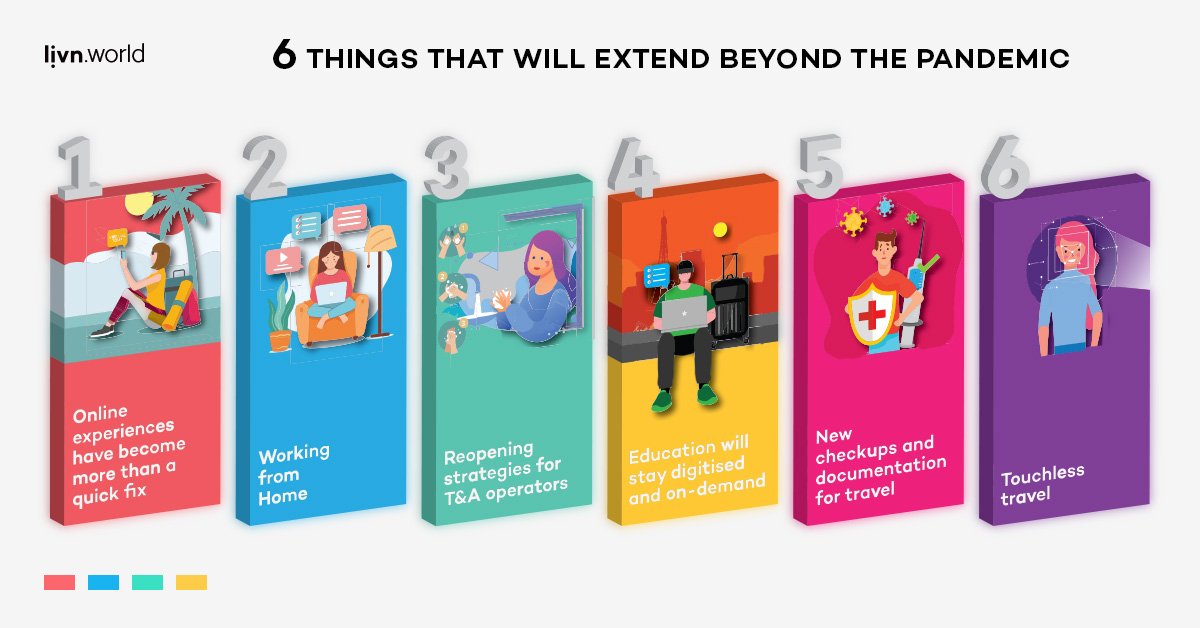As the COVID-19 pandemic starts to subside, businesses are beginning to open their doors, economies will slowly recover, and travellers will regain confidence again.
Consumer attitudes, government guidelines, and the new adoption of technology across all age groups have changed the way we operate, and some for the better.
We highlighted a list of 6 trends that have an impact on the travel industry and have shown us signs that they are here to stay.
#1 Online Experiences Have Become More Than a Quick Fix
Plenty of businesses that relied on in-person experiences as the core of their business models, like activity providers and museums, have had to pivot towards online experiences. Even if it initially appeared like it wouldn’t be adopted, they have had to innovate quickly and find a way to engage with their audience.
Providers such as Airbnb are actively working on building an online experience marketplace which they intend to keep active beyond the pandemic, offering a place where guests and hosts can still engage with their product and continue to build a community.
Tour operators should expect digital competition to increase and now have an opportunity to bring their experiences online.
#2 Health and Safety Procedures
One of the main challenges most of industries face with reopening is to define best practices to build consumer confidence and a sense of safety.
Major travel companies are partnering with consumer brands to enhance and promote their new cleaning standards. Hilton partnered with Reckitt Benckiser (maker of Lysol) and Extended Stay America partnered with Procter & Gamble brands like Mr. Clean on its new 10-point cleaning process.
Tour operators and venues should focus on areas like contactless payment, floor markings, hand sanitising stations, temperature checks and potentially the provision of personal protective equipment (PPE) for staff and customers. How clear they communicate these measures to their customer is crucial in gaining back their trust and confidence.
#3 New Checkups and Documentation for Travel
Once a vaccine is discovered and deemed safe to use, it is not unreasonable to assume that some territories will require travellers to have immunisation records.
Some countries, such as the UK, are looking into an ‘immunity passport’, a digital or physical document that certifies an individual has been infected and is purportedly immune to Covid-19. Individuals in possession of an immunity passport could be exempt from physical restrictions and could return to work, school, and daily life. However, there are many hurdles – legal, equitable and scientific alike – to solve.
The travel industry should look at ways they can assist and help facilitate documentation and safe practices, or they could face delays to bookings and the traveller experience altogether.
#4 Touchless Travel
To minimise the risk of infection in high-frequency hubs such as airports, technological solutions will likely be implemented to ensure automation and contactless travel.
Touchless or contactless travel was already beginning to be implemented with biometrics like facial recognition adopted in some airports, but new touchless options will become available – most of them being touchless fingerprint readers, document scans, voice and gesture controls.
Intrepid Travel recently released a Health and Safety Guideline where they state the prioritisation of ‘low touch’ approach as a key feature when sourcing new partners and solutions. This will include removing ground paperwork and contracting partners who offer contactless technology to their guests such as room keys and lights, online ticketing and payment options.
This new era of no-contact travel should provide a more seamless and futuristic experience for travellers as well as being more hygienic which in turn will assist building consumer confidence.
#5 Working from Home
Most companies had to adopt remote working quickly to keep operations afloat, which included creating new policies to account for the change in the work environment.
According to the organisational management consultancy Gallup, the number of remote workers raised from 31% to 62% in 2 weeks in March. The poll also revealed that 59% of respondents would prefer to work remotely after restrictions are lifted.
Global advisory firm Gartner conducted a survey that highlighted that 74% of companies plan to permanently shift to more remote work post COVID-19.
For travel, this means there may be an increase in bookings outside of peak seasons as flexibility allows staff to work from anywhere. The shift away from ‘desk time’ and a focus on output and productivity will allow more flexibility for travellers who may increase their frequency of holidays or shorter trips taken per year.
#6 Education Will Stay Digitised and On-Demand
As schools and colleges have closed, countries have moved education to the digital realm. As of June 6, 2020, more than 1.1 billion learners from early education to tertiary level were affected by closures, the school closures impacted over 60% of the world’s student population. UNESCO has deployed resources to make the shift faster, offering technical assistance, guidelines and webinars, digital learning and learning platforms, many of which will remain standard tools to use in the post-COVID19 classrooms.
This shift into online learning is reminiscent of the changes in remote working. Many tertiary students who want flexibility and to travel may opt into online learning instead. It could create a new type of traveller, one that does not opt for a ‘gap year’ but instead travels whilst studying.
The Digital Era Has Been Fast-Tracked
Ultimately, the COVID-19 pandemic has profoundly altered the way we operate. While some industries, like travel, have been more impacted than others, most have been affected and are required to reevaluate their business models to adapt to the changing environment.
The pandemic has fast-tracked changes and digitisation and it is safe to say that many are here to stay. From more online experiences, better digital connectivity, remote work and learning, as well as new health procedures.
The world has indeed been forever changed but with that, we can see innovation in areas that benefit us in becoming a more tech-connected world defying previous limitations.










